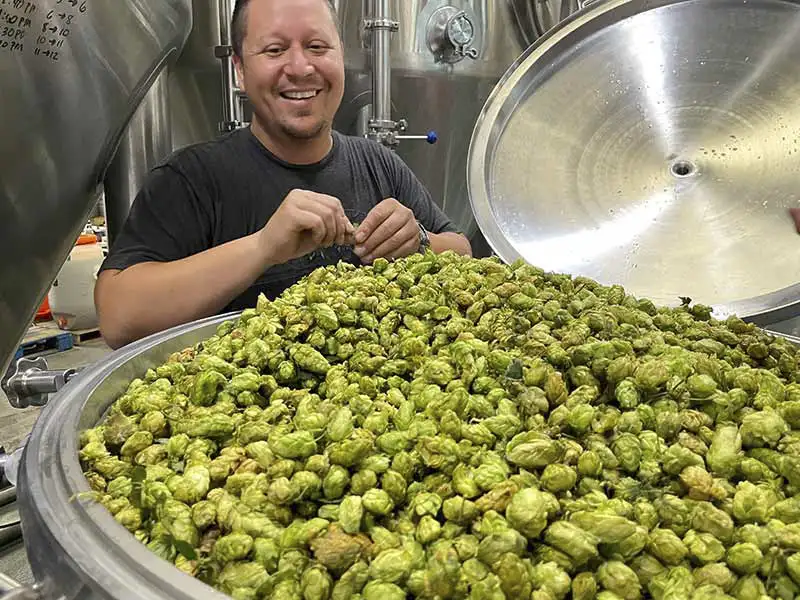
There’s something about enjoying a wet hop beer like no other. The hop harvest in the U.S. is treated like the holiday season for the craft beer industry—for both brewers and consumers. The unfortunate part, though, is if you aren’t within a certain radius of the Pacific Northwest, you don’t always have the opportunity to brew or consume wet hop beers. But with new technology, RipeLocker looks to change all that.
We chatted with RipeLocker Senior Director of Fruit Sciences Brendon Anthony, Oasis Farms Owner Brenton Roy and Hop Manager Tyler Sabin, and Roadhouse Brewing Brewmaster Max Shafer to learn about the technology behind RipeLocker, how it works, its benefits, and whether it’s worth it.
(Above photography courtesy of RipeLocker)
Affordable, Industry-Leading Brewery Software
What Exactly Is RipeLocker?

Photography courtesy of RipeLocker
RipeLocker is a pallet-sized low-pressure storage unit that locks in the freshness of produce.
“Like what a hypobaric chamber does for humans, the RipeLocker does the same thing for produce,” Anthony explains. “We control the atmosphere inside … to slow down the deterioration or aging of all types of produce.”
Essentially, the vacuum pump rapidly establishes controlled atmosphere conditions and reduces the number of molecules, creating an ultra low-oxygen environment that reduces respiration and suppresses ripening by maintaining high humidity and constant control of pressure, oxygen, and carbon dioxide.
“It’s about a tenth of the atmosphere,” Anthony says. “Low oxygen reduces respiration rate. Periodic cycles maintain freshness.”
This is not entirely new. Anthony says it has been around for a half century but hasn’t succeeded commercially due to size, cost, and other variables. He says that RipeLocker, which is made entirely from recyclable plastic, has a small footprint (forty-eight inches by forty inches and thirty-six inches tall), can be stacked two high, is portable with a forklift, and is designed to fit into a shipping container, opening up doors for commercialization.
Anthony says that the technology is monitored and controlled remotely around the clock by WiFi or cellular data and was initially developed to work on fresh fruits before a hop grower asked about the possibility of using RipeLocker on hops.
“The tech came to us as a way to take care of blueberries,” says Roy, who adds that Oasis is a shareholder of RipeLocker and he sits on the company’s Board of Directors. “And we thought it would work well on hops.”
Oasis used RipeLocker for three years on blueberries before dabbling in hops. But they had to wait for RipeLocker to learn the best environment for hops.
“Our first trial with hops was during the 2020 harvest season,” says Anthony, noting the company’s efforts to find the correct environment for wet hops led to more trials in 2021 and 2022 before the final R&D proof of concept and the commercial launch.
Anthony says that, from the trials, they found that RipeLocker maintains optimal hop freshness for six to eight weeks.
“We tried ten weeks,” Anthony says, “but the hops went bad.”
RipeLockers have an internal volume of 750 liters and can hold anywhere from 150 to 200 pounds.
“It depends on the cone size and how compact they are,” Anthony says.
Anthony says RipeLocker has been used for two harvest seasons: 2,000 pounds of hops went into RipeLockers in 2022 and around 5,000 in 2023.
“We have worked with eight different breweries from three central growers in Washington State and Idaho,” Anthony says.
While Anthony says Oasis Farms has been their primary partner, they are still formalizing more relationships.
“We’re working on deals as we speak,” he says. “It’s a new space, so it’s going to take time. Every year, we want to try to double our volume. We have no capacity issues.”
What Are the Logistics of RipeLocker?

Photography courtesy of RipeLocker
Anthony says the RipeLocker technology typically stores hops at the hop grower’s facility.
“We provide the tech to the grower, who then uses it to fulfill sales,” Anthony says. “Then they arrange transit with the brewer.”
Roy says that breweries reach out to Oasis and pre-order wet hops they intend to use for their wet hop beers, and the grower will order the RipeLocker to store the hops for when the brewery is ready.
“This gives us a way to sell to market that isn’t a nightmare for us,” Sabin says. “When wet hops [are ready], we just load them into ag bags … and hook up to a RipeLocker.”
Logistically, it’s less of a headache.
“The RipeLocker allows breweries to get the hops they want at a certain time,” Sabin says. “They tell us how many pounds they want, and we pick the fields and put them into a RipeLocker based on the pounds they requested. It’s on a use basis.”
Shafer explains how they brew anywhere from eight to fourteen wet hop beers a year (they did twelve in 2023). They would previously have wet hops overnighted or make a four-and-a-half-hour trek to handpick many hops they liked.
“That’s how we always did it. It’s a relationship builder, and we get to work with farmers,” Shafer says. “But RipeLocker opened up a whole new world for us.”
Shafer adds, “Convenience is huge. Whether we are brewing a production-scale batch or a single turn, RipeLocker gives us that chance. We can get a window, work with the grower, and plan a brew day around that. It really helps.”
The Three Main Benefits of RipeLocker

Photography courtesy of RipeLocker
Anthony says there are three specific benefits that RipeLocker brings to the craft beer industry.
“The value propositions we like to highlight,” he says, “are they store wet hops longer, you can mix and match hops from different pick seasons, and it’s a cheaper transit cost.”
Wet Hops Stay Fresh Longer
Roy recalls how hectic harvest season was for Oasis and how RipeLocker helped change some of that.
“In the past, wet hops had to be harvested, packed into boxes with ice, and then mailed, and the brewery had to use them immediately,” Roy says. “For this, we can pick and choose when we take the hops and put them in the RipeLocker, and they can be held there for [as many as] sixty days.”
A fan of longer freshness time for wet hops for a specific reason, Schafer says, “For us, it extends the wet hop brewing season, which is cool. It’s fun to extend the time when people return home for holidays in November and December.”
He adds one caveat. “The biggest problem is that consumers are so educated and know so much. So we need to educate them on how RipeLockers extended the hop life, and they aren’t drinking old beer.”
Mix and Match Hops from Different Pick Seasons
This is Shafer’s favorite perk of RipeLocker.
“We can brew wet hop beers with hops from different pick times, which we couldn’t do before,” he says. It’s been enjoyable to hone in on hop varieties and their pick windows, and we are excited to work with growers on that.”
Roadhouse uses a “boatload” of Centennial hops, and with RipeLocker, now Shafer says it’s been fun to pair the old-school hop with one like Mosaic.
“It’s cool to marry those two in this wet hop experience,” Shafer says.
Roy echoes Shafer and adds that the RipeLocker offers versatility in addition to mellowing out the controlled chaos of a typical harvest.
“Previously, it was impossible to have two different varieties of wet hops,” Roy says. With RipeLocker, it’s possible now.”
Cheaper Shipping Costs
Anthony notes that the total cost of hops is anywhere from $8 to $12 per pound, which factors in all costs.
Roy says currently the pricing is extremely variable and that, as the product scales, a more defined freight cost will come into play, noting quantity, distance, and nearby customers, among other factors.
“For now it is something that must be worked out in a case-by-case basis,” Roy says. “Our goal, and the only way to be successful, is to supply the brewers with a superior product at a lower cost.”
Shafer says Roadhouse works with other breweries in the area to reduce freight costs.
“We are just trying to link up with other breweries within our region to get a couple of lockers,” he says. “We’ve worked with RipeLocker to develop great lanes and make drops to all.”
Roy estimates that RipeLocker’s cost, when it comes to shipping pounds of hops to a brewer, is a saver.
“The RipeLocker costs are less than overnight cost via shipping services,” Roy says. “Comparatively speaking, it isn’t a higher cost.”
One added benefit of cheaper freight is providing wet hop access to breweries across the country.
“Our hope is to democratize the wet hop beer market,” Anthony says. “We want to open that up to brewers in Florida and the East Coast [that otherwise wouldn’t have access].”
Shafer says that doesn’t factor into the benefits he gets as a Wyoming brewery, but he can see the value that access brings.
“It’s really cool for brewers in, say, Tampa that can get three hundred pounds of [wet hop] Citra for a beer,” Shafer says. “That’s what I like about it.”
Adds Roy, “The number one benefit, hands down, is the just-off-the-vine fresh quality going to a brewer across the country. It’s never been done before [RipeLocker], and now it can.”
That brings exposure to wet hop beers for consumers nationwide.
“Exposure to fresh hop ales is massive,” Sabin says. “Fresh hop ale [nationwide wasn’t possible] because it was cost prohibitive or logistically impossible. RipeLocker allows breweries anywhere to do this.”
He adds, “Everything gets easier with this product. If you have a downtown area with a lot of breweries, and they are all closely located, this is a huge plus for cost and logistics.”
One Downside of RipeLocker
Both Oasis and Roadhouse see one downside of the RipeLocker.
While occasionally a RipeLocker will be at a brewery for one to two days, the ideal situation would be for the brewery to receive it, use the hops, and send the RipeLocker right back. Shafer says the best plan is to unload the hops once the RipeLocker arrives.
“Getting the RipeLocker back can be an issue,” Roy says. “Outside of that, I don’t think there are any downsides.”
Roy says that’ll be less of an issue with scale. Shafer agrees that the only downside is coordinating the return of the RipeLocker.
“By the time they get here, we’re ready to drop the hops. You gotta be organized and ready,” Shafer says. “If you’re not organized, that’s on you. There’s really not much of a downside.”
Is RipeLocker Worth It?

Photography courtesy of RipeLocker
Roy says it’s a win-win for all involved.
“From the grower’s side, it is worth it,” says Roy, who admits he thinks RipeLocker is the future of wet hop beers. If you want to do wet hops, it’s worth it. From the brewer’s side, it’s absolutely worth it.”
Shafer says that RipeLocker is one hundred percent worth it.
“It’s a great way for someone who can’t normally get wet hops, and the quality of the hops is fantastic,” Shafer says. “It opens up a new world of wet hop brewing for everyone.”



